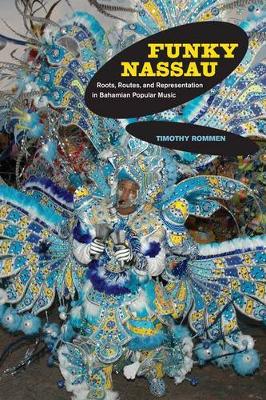Music of the African Diaspora
2 primary works
Book 11
"Mek Some Noise", Timothy Rommen's ethnographic study of Trinidadian gospel music, engages the multiple musical styles circulating in the nation's Full Gospel community and illustrates the carefully negotiated and contested spaces that they occupy in relationship to questions of identity. By exploring gospelypso, jamoo ('Jehovah's music'), gospel dancehall, and North American gospel music, along with the discourses that surround performances in these styles, he illustrates the extent to which value, meaning, and appropriateness are continually circumscribed and reinterpreted in the process of coming to terms with what it looks and sounds like to be a Full Gospel believer in Trinidad. The local, regional, and transnational implications of these musical styles, moreover, are read in relationship to their impact on belief (and vice versa), revealing the particularly nuanced poetics of conviction that drive both apologists and detractors of these styles.
Rommen sets his investigation against a concisely drawn, richly historical narrative and introduces a theoretical approach which he calls the 'ethics of style' - a model that privileges the convictions embedded in this context and that emphasizes their role in shaping the terms upon which identity is continually being constructed in Trinidad. The result is an extended meditation on the convictions that lie behind the creation and reception of style in Full Gospel Trinidad.
Rommen sets his investigation against a concisely drawn, richly historical narrative and introduces a theoretical approach which he calls the 'ethics of style' - a model that privileges the convictions embedded in this context and that emphasizes their role in shaping the terms upon which identity is continually being constructed in Trinidad. The result is an extended meditation on the convictions that lie behind the creation and reception of style in Full Gospel Trinidad.
Book 15
This book examines the role music has played in the formation of the political and national identity of the Bahamas. Timothy Rommen analyzes Bahamian musical life as it has been influenced and shaped by the islands' location between the United States and the rest of the Caribbean; tourism; and Bahamian colonial and postcolonial history. Focusing on popular music in the second half of the twentieth and early twenty-first centuries, in particular rake-n-scrape and Junkanoo, Rommen finds a Bahamian music that has remained culturally rooted in the local even as it has undergone major transformations. Highlighting the ways entertainers have represented themselves to Bahamians and to tourists, "Funky Nassau" illustrates the shifting terrain that musicians navigated during the rapid growth of tourism and in the aftermath of independence.

